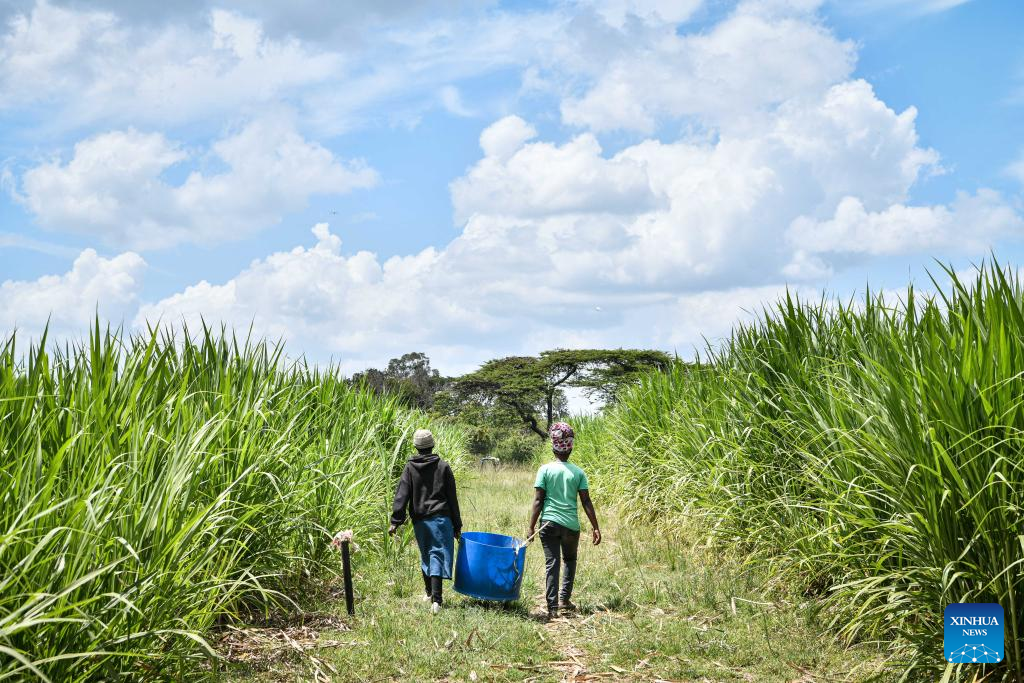
Local farmers work at a Juncao farm in Lenginet village, Nakuru, Kenya, on Jan. 26, 2024. Introduced by Chinese agripreneur Jack Liu in 2021, Juncao grass has revolutionized animal husbandry in Kenya's semi-arid outposts, guaranteeing an uninterrupted supply of nutritious fodder to herders and subsistence farmers. (Xinhua/Han Xu)
NAIROBI, Jan. 31 (Xinhua) -- The lush green, tall, and succulent grass at the expansive Juncao farm in Kenya's northwestern county of Nakuru swayed to the rhythm of a Friday afternoon wind, creating a spectacle to behold.
Inside the 50-acre (about 20 hectares) farm, a group of local farmers and workers strolled as they enjoyed the ambience and the sight of more than six-meter tall grass that has defied harsh elements to blossom.
Introduced by Chinese agripreneur Jack Liu in 2021, the grass has revolutionized animal husbandry in Kenya's semi-arid outposts, guaranteeing an uninterrupted supply of nutritious fodder to herders and subsistence farmers.
In the last couple of weeks, Francis Fwamba Wanambisi, a 60-year-old dairy farmer, has been a regular visitor to the farm where he has been purchasing Juncao grass at a reasonable cost to feed his nine cows.
"So far I have bought this grass three times since the beginning of the year and have witnessed tremendous improvement in my cows. Their milk production has doubled," Wanambisi told Xinhua at the farm.
Three of his cows are zero grazed and the moment he started feeding them the grass, each started producing five and a half liters of milk in the morning, up from around three liters.
Wanambisi learned about the Juncao grass from his peers who spoke highly of its rich nutrition content including proteins that are key to high milk output among local cattle breeds.
As his cows now produce more milk, the father of eight said he is selling the surplus at the local shopping center, earning him a decent income to sustain his family.
Located at the tip of Nakuru county's expansive plains that are semi-arid, the Juncao farm has changed the topography and weather of a hot, water-scarce and food-insecure rural hamlet.
Liu, the farm's chief executive officer and founder, said it has acted as a model for sustainable cattle feed production in Kenya, through harnessing cost-effective but locally adaptable Chinese technology.
"We are specialized in Juncao grass plantation, supplying silage to local livestock farmers," Liu said.
Juncao grass, according to Liu, has a crude protein content of 18.6 percent, can be harvested more than five times annually, has an annual yield of about 180 tonnes per acre and takes 12 weeks to mature.
When fed to dairy cows, Juncao grass can boost milk yield by 40 percent, while beef cattle can attain 500 kg in 12 months when they consume the fodder that is disease-, pest- and drought-resistant, according to Liu.
Grown in over 100 countries worldwide and gaining traction in Africa, the Juncao grass was developed by Chinese scientists in Fujian province in the 1980s, and has superior features including height, broad leaves and sugar-rich stems.
Liu disclosed that plans are afoot to establish 50,000 acres of Juncao grass across Kenya and so far, the fodder is being cultivated in several semi-arid counties, aided by irrigation.
"Juncao grass is Chinese wisdom, transforming pastoralism in Africa. One acre can feed twenty cows," Liu said.
He added that Juncao grass can be used to control desertification, soil erosion, and land degradation, and boost biodiversity protection while helping communities cope with the climate crisis.
In December 2021, the managing director of Kenya Plant Health Inspectorate Service (KEPHIS) Theophilus Mutui said that after thorough inspections and audits at an open quarantine facility in southeastern Kenya, the regulator observed that Juncao grass complied with all plant health requirements.
No pest of major concern or risk of invasiveness was detected in the grass during the inspection, according to the letter from Mutui.
"The company is therefore allowed to expand the acreage under Juncao grass production and establish more fields," Mutui said.
Monitoring of Juncao grass by the regulator has been ongoing and no threat to human or environmental health has been detected, said Erick Were, an inspector at KEPHIS.
John Chelimo, a 50-year-old smallholder farmer from Nakuru county, said that he has planted Juncao grass in his farm and after feeding it to his grade cattle, milk production has shot up.
In addition, Chelimo said that local farmers have embraced the grass, having cushioned them from perennial fodder shortages linked to harsh weather. ■

Local farmers crush Juncao crops at a Juncao farm in Lenginet village, Nakuru, Kenya, on Jan. 26, 2024. Introduced by Chinese agripreneur Jack Liu in 2021, Juncao grass has revolutionized animal husbandry in Kenya's semi-arid outposts, guaranteeing an uninterrupted supply of nutritious fodder to herders and subsistence farmers. (Xinhua/Han Xu)
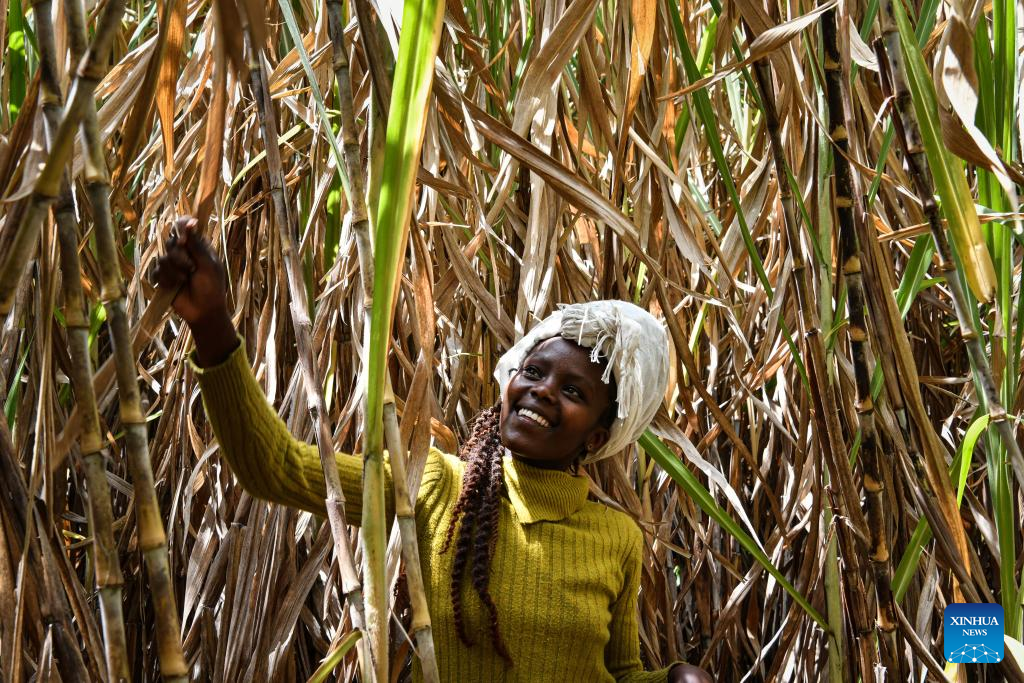
A local farmer removes weeds at a Juncao farm in Lenginet village, Nakuru, Kenya, on Jan. 26, 2024. Introduced by Chinese agripreneur Jack Liu in 2021, Juncao grass has revolutionized animal husbandry in Kenya's semi-arid outposts, guaranteeing an uninterrupted supply of nutritious fodder to herders and subsistence farmers. (Xinhua/Han Xu)
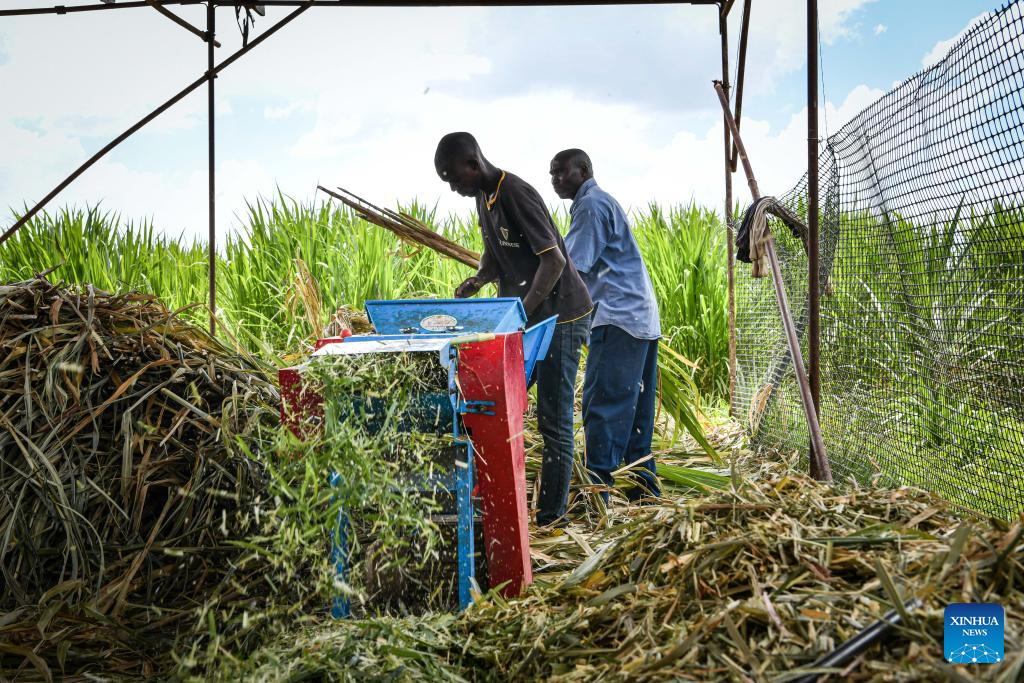
Local farmers crush Juncao crops at a Juncao farm in Lenginet village, Nakuru, Kenya, on Jan. 26, 2024. Introduced by Chinese agripreneur Jack Liu in 2021, Juncao grass has revolutionized animal husbandry in Kenya's semi-arid outposts, guaranteeing an uninterrupted supply of nutritious fodder to herders and subsistence farmers. (Xinhua/Han Xu)
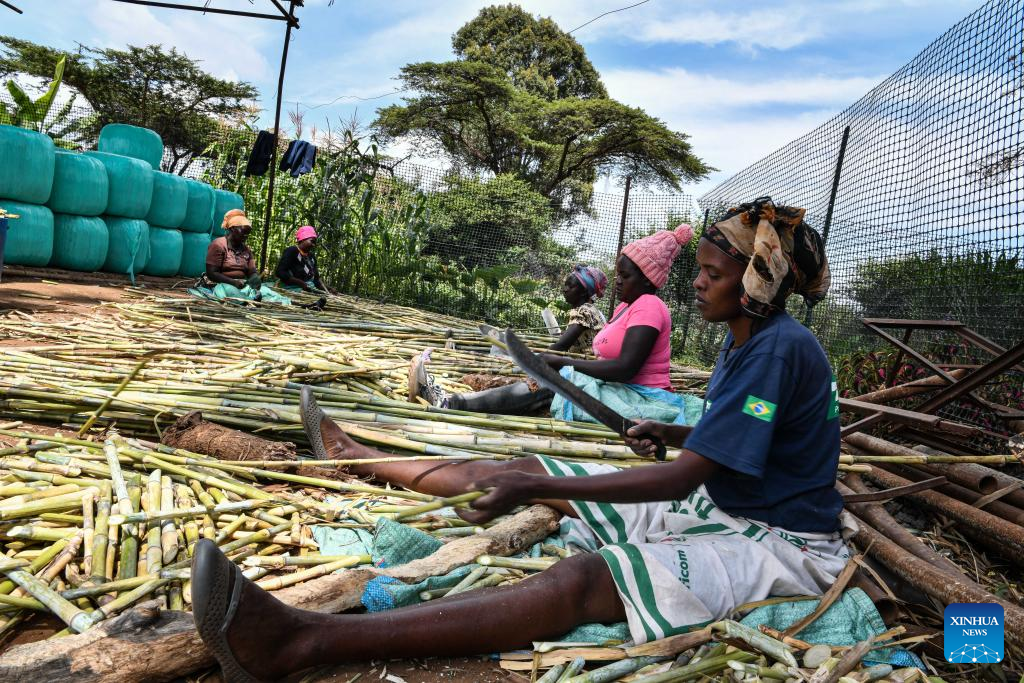
Local farmers cut Juncao straw at a Juncao farm in Lenginet village, Nakuru, Kenya, on Jan. 26, 2024. Introduced by Chinese agripreneur Jack Liu in 2021, Juncao grass has revolutionized animal husbandry in Kenya's semi-arid outposts, guaranteeing an uninterrupted supply of nutritious fodder to herders and subsistence farmers. (Xinhua/Han Xu)

Local farmers crush Juncao crops at a Juncao farm in Lenginet village, Nakuru, Kenya, on Jan. 26, 2024. Introduced by Chinese agripreneur Jack Liu in 2021, Juncao grass has revolutionized animal husbandry in Kenya's semi-arid outposts, guaranteeing an uninterrupted supply of nutritious fodder to herders and subsistence farmers. (Xinhua/Han Xu)
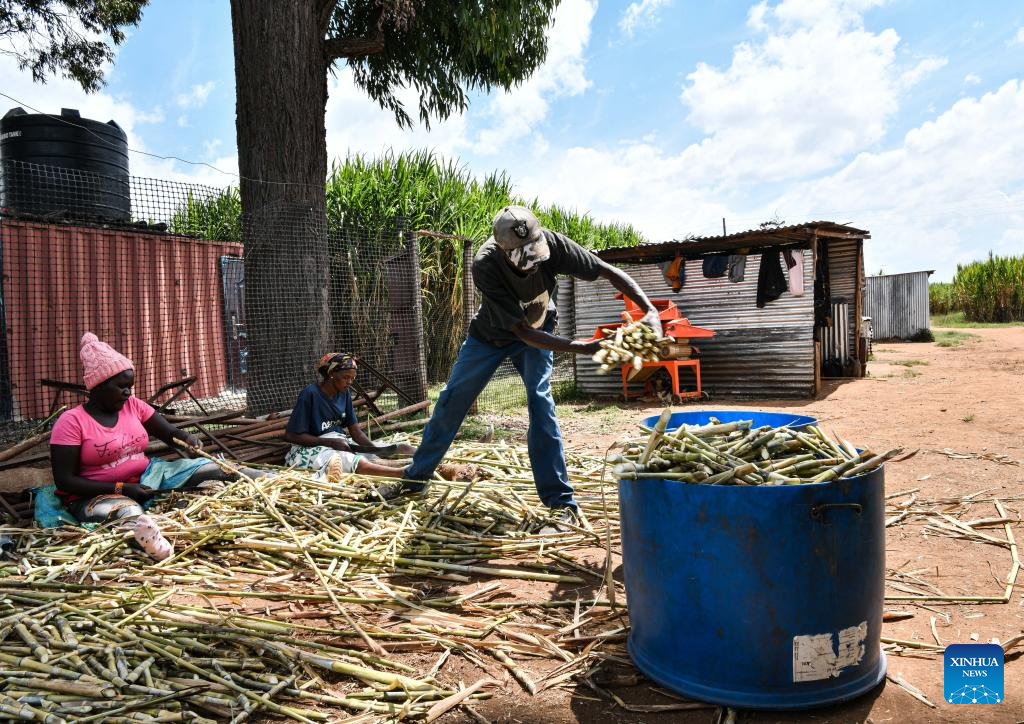
Local farmers cut Juncao straw and collect them at a Juncao farm in Lenginet village, Nakuru, Kenya, on Jan. 26, 2024. Introduced by Chinese agripreneur Jack Liu in 2021, Juncao grass has revolutionized animal husbandry in Kenya's semi-arid outposts, guaranteeing an uninterrupted supply of nutritious fodder to herders and subsistence farmers. (Xinhua/Han Xu)

Local farmers remove weeds at a Juncao farm in Lenginet village, Nakuru, Kenya, on Jan. 26, 2024. Introduced by Chinese agripreneur Jack Liu in 2021, Juncao grass has revolutionized animal husbandry in Kenya's semi-arid outposts, guaranteeing an uninterrupted supply of nutritious fodder to herders and subsistence farmers. (Xinhua/Han Xu)
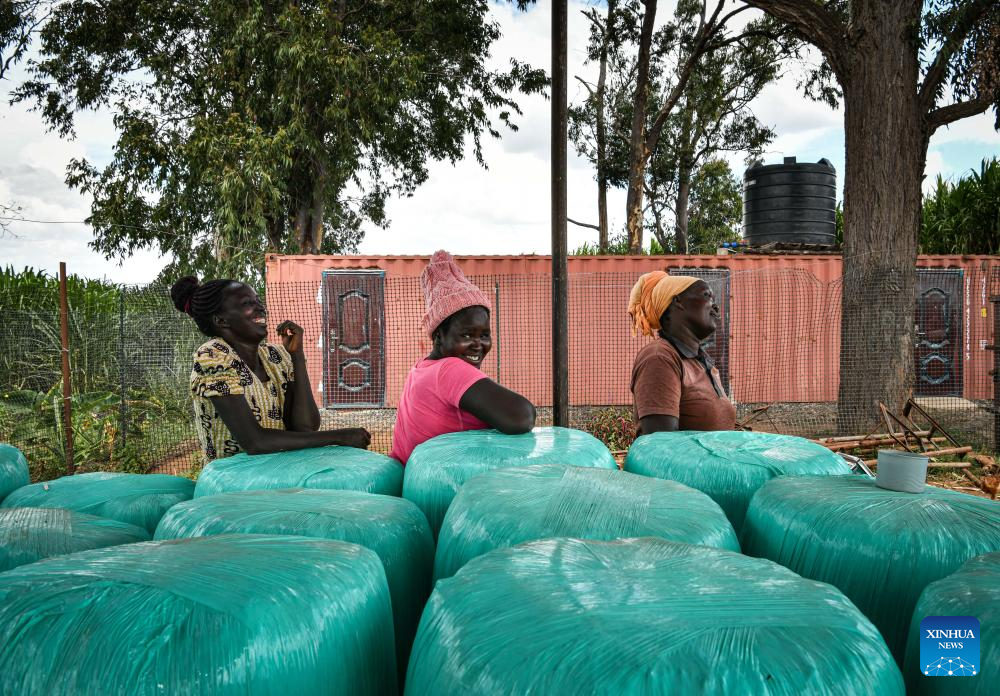
Local farmers rest by Juncao fermentation bags at a Juncao farm in Lenginet village, Nakuru, Kenya, on Jan. 26, 2024. Introduced by Chinese agripreneur Jack Liu in 2021, Juncao grass has revolutionized animal husbandry in Kenya's semi-arid outposts, guaranteeing an uninterrupted supply of nutritious fodder to herders and subsistence farmers. (Xinhua/Han Xu)
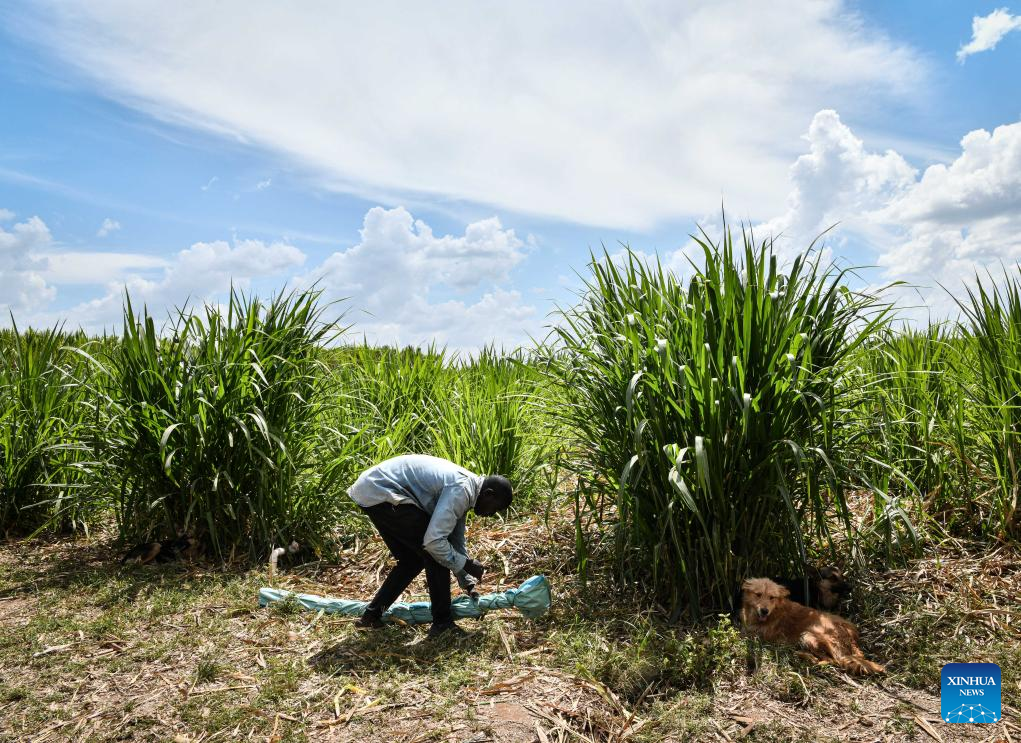
A farmer packs Juncao samples and prepares to send them to Kenya Plant Health Inspectorate Service (KEPHIS) for a test at a Juncao farm in Lenginet village, Nakuru, Kenya, on Jan. 26, 2024. Introduced by Chinese agripreneur Jack Liu in 2021, Juncao grass has revolutionized animal husbandry in Kenya's semi-arid outposts, guaranteeing an uninterrupted supply of nutritious fodder to herders and subsistence farmers. (Xinhua/Han Xu)

Local farmers crush Juncao crops at a Juncao farm in Lenginet village, Nakuru, Kenya, on Jan. 26, 2024. Introduced by Chinese agripreneur Jack Liu in 2021, Juncao grass has revolutionized animal husbandry in Kenya's semi-arid outposts, guaranteeing an uninterrupted supply of nutritious fodder to herders and subsistence farmers. (Xinhua/Han Xu)
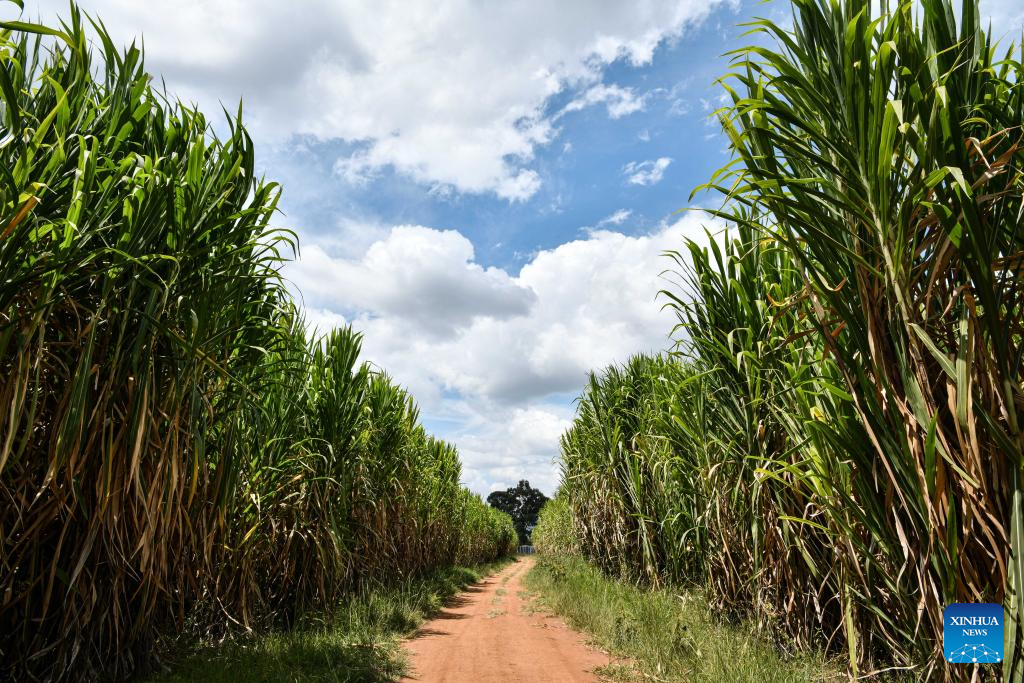
Photo taken on Jan. 26, 2024 shows a view of a Juncao farm in Lenginet village, Nakuru, Kenya. Introduced by Chinese agripreneur Jack Liu in 2021, Juncao grass has revolutionized animal husbandry in Kenya's semi-arid outposts, guaranteeing an uninterrupted supply of nutritious fodder to herders and subsistence farmers. (Xinhua/Han Xu)
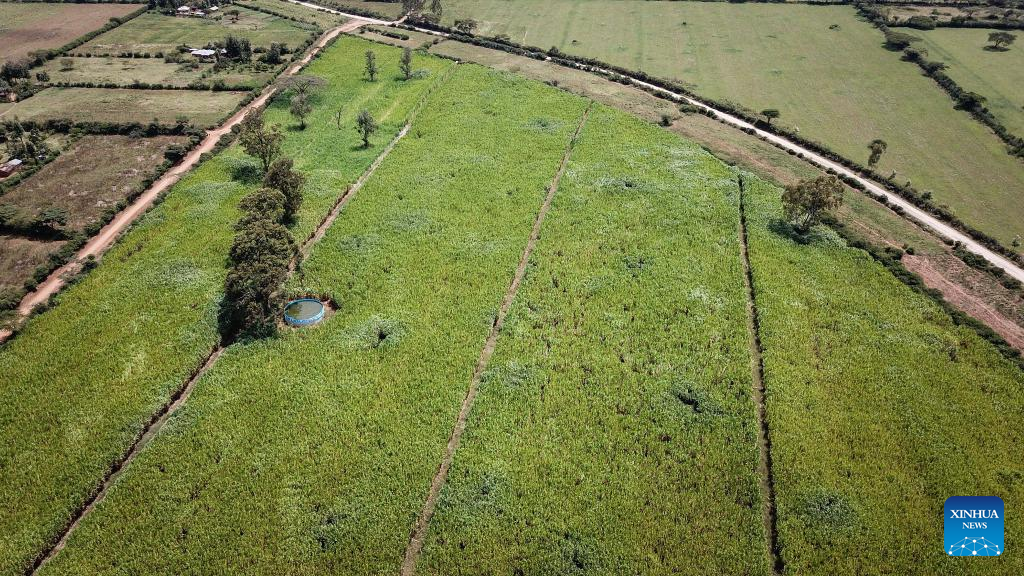
The aerial photo taken on Jan. 26, 2024 shows a view of a Juncao farm in Lenginet village, Nakuru, Kenya. Introduced by Chinese agripreneur Jack Liu in 2021, Juncao grass has revolutionized animal husbandry in Kenya's semi-arid outposts, guaranteeing an uninterrupted supply of nutritious fodder to herders and subsistence farmers. (Xinhua/Han Xu)

The aerial photo taken on Jan. 26, 2024 shows a view of a Juncao farm in Lenginet village, Nakuru, Kenya. Introduced by Chinese agripreneur Jack Liu in 2021, Juncao grass has revolutionized animal husbandry in Kenya's semi-arid outposts, guaranteeing an uninterrupted supply of nutritious fodder to herders and subsistence farmers. (Xinhua/Han Xu)
